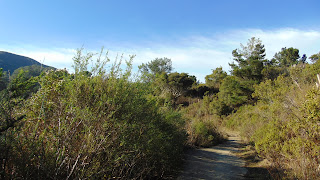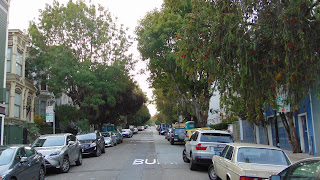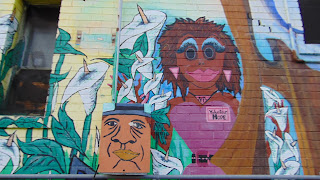
 |
| Scenes from the Howard Zinn bookfair, including this writer and Roxanne Dunbar-Ortiz and a discussion of 100 years of sex workers rights. |

Its been a couple of years since
I’ve done a talk on rebel friendships. But with the follow up research on its way, I
hoped to explore some of the additional ideas I’ve had about the topic at the
Howard Zinn bookfair last weekend.
Ron and I woke in Pacifica and made our way to the
fair, exploring the piers and murals of the city, teeming with color and
people, bright messages sprawled over the walls.
After looking at the panels, I walked over to the bookfair
on Valencia, where I identified several talks to attend, including on by
Roxanne Dunbar-Ortiz, another on DiY Oral History methods, and 100 Years of Sex
Work organizing in San Francisco. Each
panel was filled with people and ideas.
I adore Roxanne Dunbar Ortiz. She’s smart and kind and very humble in her
way. She stood reading from Loaded, her new history of the second
amendment. The argument of her new book is simple:
Several old friends would be on my panel. I knew Eddie Yuen and Andrej Grubacic fifteen years
ago when we
were all in an anarchist reading group together. Eddie joined me for lunch
and we talked about the challenges of the project. How do friendships endure conflicts or
differences of opinion? When is it
possible to agree to disagree? Can we still
support a diversity of tactics, even in the face of vast disagreements? And when is a fight or a conflict too
much? How much can we tolerate? And when does a friendship break down?
Eddie immediately argued that today’s call out culture
makes it hard. But he also acknowledged
that friendship still helped support movements in countless ways.
Writer and organizer Chris Carlson was in attendance. We talked about critical mass
friendships and relationships that grow out of all those rides.
After i spoke, Eddie recalled a friend saying to him that he could
see the reflection of burning police cars in the reflections in his eyes in
1991 at the Gulf War Protests.
Another world is possible. And its not just the zombie apocalypse. You see it in gestures of mutual aid
extending through the parameters of friendship, argued Yuen.
Much about politics is antagonistic. We oppose systems of oppression. This is part of what we do. But it can also be problematic.
There’s also this idea of universal humanity, a
universal sisterhood, albeit a Eurocentric one.
Yet, capitalism seems to commodify everything – from
ideas to movements, even the ocean floor. And this transforms our relations to
each other.
There has to be an outside to this.
There has to be antagonistic movement.
But there can also be pleasure and somehow these are
connected.
We were a part of the global justice movement that
aimed to bring pleasure back into social movements, away from austerity and
sacrifice to a place that sees this good feeling as bountiful and expanding,
instead of depleting. There has to be connection and fun.
Finnishing, Yuen read a poem he had been talking about
with Anrej, by the Greek communist poet Yannis Ritsos 1958 This is poem about an infamous Romanian prison Daftani.
Here the rain's speech stops.
Here the glass barbed wire of a fruitless sorrow stops.
Here the fortune teller of silence stops
in the open palm of a yellow leaf. On this leaf
I saw the dry veins of a dead sensitivity branched
like the octopus of an underhanded courtesy pressed out of history.
Here the delicate hesitation stops.
Here the moaning of the sick stops.
Here words lose their uncertain sound.
A wall becomes a wall.
A comrade becomes a comrade.
The world is kept inside the comrade.
Thought is vertical—a line drawn across the ground
extending into the sky like a blade
drawn across bread, like the resolve of justice
drawn across the hearts of the wronged, like
the belief in communism drawn across the blood of heroes and martyrs,
like the sun's sword drawn across the night's heart.
Hundreds of communists were tortured here in the 1930's. Including Greeks and Yugoslavs. It used to be a museum. Now it is a paintball court.
Here the dialectic of hesitation stops, Eddie followed. What was lost – the level of sacrifice
for the idea of liberation. There is something about comradeship that
offers us something noble, not that all our efforts are grand but small
gestures add up in the right direction.
The room filled with hands of people wanting to talk
about friendship and movements.
Chris Carlson followed, explaining that he has lived
through many cycles of friendship. Yet
call out culture has receded some of these cycles. We want to be together. But we beat each other up. We need a larger
commitment to hang with each other.
The real issues of public space are often
convivial. Out of that deep friendships
can grown and persist.
I noted we are all a part of a broad movement with
lofty aims. Yet all to often we treat
other like shit, taking our efforts for granted. We stumble over politics and pronouns.
A trans woman followed noting that issues of pronouns
are very real to her. These are not to be dismissed as mere political
correctness. And far to many cisgender
men dismiss them. Can we move beyond
defensiveness?
A politics of friendship requires that we commit to listening
to each other, to learning who the other is, to engaging the other, learning a
bit about their subjectivity.
Charles Fowler noted, "internally the dynamics that I have seen have been inherently rebel friendships they have built spaces for connection called solidarity circles which essentially functioned as peer to peer mentoring and mental health work. But also they built accountability circle called "concerns" circles for when peoples behaviors shifted or neglected the collective or simply if folks were going through a rough time they could call a concerns circle for themselves even."
Charles Fowler noted, "internally the dynamics that I have seen have been inherently rebel friendships they have built spaces for connection called solidarity circles which essentially functioned as peer to peer mentoring and mental health work. But also they built accountability circle called "concerns" circles for when peoples behaviors shifted or neglected the collective or simply if folks were going through a rough time they could call a concerns circle for themselves even."
Countless members of the audience raised their hands
pointing out that today we are deep into antagonism and call out culture. Lessons of a debate over a diversity of
tactics seem to have been lost. We can
learn from each other. We have to.
That’s what the ‘#metoo’ conversation is all about. But this all takes
place within a contest of capitalism.
What has capitalism does to our subjectivity?
Not enough of us are acting, discussing and assessing
our actions, noted another organizer.
Can we learn from our actions?
Love is productive noted Eddie. Its growing and expanding.
Yet, we are in a period when people like to hear
themselves speak. The individualism of
our moment reduces our capacity to expand.
Its part of the specifics of what capital does, the individualism of
loving to hear ourselves speak.
Eddie referred to Michael White, who claimed he invented occupy.
The media commodifies dissent and movements, people
and ideas. We saw it was with occupy and its expanding culture of activist
celebrity, those who get the most likes, the most media.
Finishing my session, I walked downstairs to take in a
panel on a century of sex worker organizing.
The authors and activists spoke in front of a sign declaring: “100 years
of struggle for sex worker rights.” They were discussing the hundredth
anniversary of perhaps the first major sex worker rally in history from 1917 in San Francisco, contextualized in the book, Alice: Memoirs of a Barbary Coast Prostitute.
Listening to the panel I thought I Emma Goldman’s
calls for solidarity among workers, sexual outsiders, and immigrants against
the exploitations of industry and moralism. She called for a big wall of
solidarity against oppression. For this, she was deported by the US and later the Soviets.
These panels, full of fresh movement scholarship and
movement analysis, are the reason I go to the Howard Zinn bookfair.
Finishing the session, I wandered out to Noe and
Castro to meet a family friend, whose been in and out of the Bay Area for a
half century. Dion met me with Charles
and the three of us talked about their fifty years of friendship. Charles had already served in Korea when he
met Dion at the University of the South as college kids, extending the relationship between his
tour in Vietnam, changes in careers, partners, trips around the world, bad cab
rides in Paris, liaisons here and memories there. Now they still talk daily, remaining friends.
San Francisco is a city of friends.
Its always lovely to visit her.
 |
| On the way back home. |
















































































































































No comments:
Post a Comment